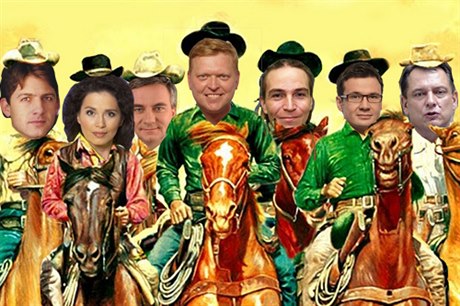Recent election polls have suggested that a series of smaller Czech political parties have a real chance of getting into the lower house of parliament at the next elections thanks to the disillusionment of voters with the main political parties. One poll by the Factum Invenio agency suggested that six parties had support above 3.0 percent; though still short of the 5.0 percent threshold needed for entering parliament, they stand a chance.
A potential turnoff for voters, however, could be their experience with Public Affairs (VV), the former junior coalition party that campaigned largely on an anti-corruption ticket and promised to break the political mould. Instead, the party was itself tarnished by a series of scandals and finally split into two last month. That experience is likely to heighten skepticism towards the new and resurgent formations trying to get votes.
Czech Position contacted the leaders of the six parties polling above 3.0 percent, as well as the Czech Pirate Party (ČPS), and asked them questions about their political goals, their programs, coalition potential and whom they identify as their main rivals. The movement ANO 2011 of billionaire Andrej Babiš was not included as its political goals have still to be clarified.
Christian Democrats (KDU-ČSL)
Ejected from parliament for the first time in the 2010 elections, the Christian Democrats (KDU-ČSL) have been hovering above the 5.0 percent support mark for the past six months — and of all the current non-parliamentary parties have the greatest hopes of getting into the lower house. The new party leader after the 2010 debacle, Pavel Bělobrádek, has in recent years succeeded in getting himself and his party a higher media profile.
The party itself has in particular profited from its campaign against Minister of Labor and Social Affairs Jaromír Drábek (TOP 09) and his problems installing a new information system for job offices. The KDU-ČSL has already named its 2013 presidential candidate as Zuzana Roithová, a Member of the European Parliament.
Deputy chairman Marian Jurečka says the party’s main motif of adherence to the social-market economy expounded by neighboring Germany has not changed since the 1990s. The details of the KDU-ČSL’s economic policy are now being prepared by the party’s economists and will, according to Jurečka, stress greater support for the working middle classes.
Jurečka blames short-termism, with parties looking no further than one political term, for the erosion of Czechs confidence in political leaders and parties. “They promise small, quick things. We need visionaries like [Tomáš] Baťa [the shoe magnate of inter-war Czechoslovakia]. People who have the courage to make plans for 10, 20 years. People with the courage to force politicians to define national and state interests. And people who have the courage not to steal,” he added.
He identities the leading center-right Civic Democrats (ODS) and TOP 09 as the party’s main political rivals.
Party of Civic Rights — Zemanovci (SPOZ)
Like the Christian Democrats, the Zemanovci, formed around former Social Democrat (ČSSD) prime minister Miloš Zeman, have seen their support rising. The party is likely to profit from his stated aim of being a candidate in the presidential race at the start of 2013. “It is really quite likely that our party would now get into parliament,” commented its current leader, Vratislav Mynář.
‘Politics is a craft and a calling. The current crop of politicians do not know how to behave...’
He says the party’s program is based on support for investment programs and also highlights its support for a law which would force the sources of all income and property to be declared publicly. Part of the fault of the current political setup, according to Mynář, is the lack of tried and tested individuals in Czech politics. “Politics is a craft and a calling. The current crop of politicians do know how to behave with their political opponents, the unending attacks and blame damages the political culture of our society,” he said.
Mynář says that the party would not be attacked into government on the basis of some blind alley program of other parties but only if it can achieve its own program targets. Otherwise, it will, he says, be an opposition party.
Green Party (SZ)
The Greens, members of the ruling coalition before 2010 but failing to get seats in the lower house in elections that year, have been quite innovative on the Czech political scene. They have opened a café which could serve as a party center and fund raiser. They have also rolled out the idea of a Green Academy, which would give green and social policy instruction.
It recently won itself attention by announcing the candidacy of former Constitutional Court judge Eliška Wagnerová as one of its candidates for Senate elections in the fall.
‘Today’s tragedy about Czech politics lies in the fact that people have almost completely stopped believing that someone can enter politics for any other reasons than personal interest or getting rich.’
Leader Ondřej Liška says there is a greater rift between the Green Party and other political parties given that they have never ceased to be part of the Czech political system and the “dirty money” and non-transparent interests connected to it.
Liška says the party has functioned out of parliament in active opposition, giving the example of its recommendations for the financing of political parties. He stresses its accent on demands for a new civil service law, tougher measures regarding public tenders and the banning of anonymous shareholdings.
The scandals surrounding Czech politics has resulted in its becoming synonymous in the public mind with pushing corrupt and particular interests. “Today’s tragedy about Czech politics lies in the fact that people have almost completely stopped believing that someone can enter politics for any other reasons than personal interest or getting rich,” he said.
“We are the strongest non-parliamentary party and I believe that this year in the fall we will become a parliamentary party,” Liška said.
The Green leader added that he sees no real competition for its liberal, pro-European, sustainable economic growth and social justice stance.
Sovereignty [Suverenita]
In an interview in September last year with Czech Position, the leader of Sovereignty, former presidential candidate and TV star Jana Bobošíková came out with the ambitious prediction that her party would get 15 percent of votes in the next elections to the lower house.
The party’s platform is based on firm criticism of the European Union and support for national interests from a conservative right-wing perspective. The platform also includes the call for immigration to be curtailed. The party declares itself to be close to the thinking of current Czech head of state, President Václav Klaus.
“We are the only Czech party that protects the national interests of the Czech Republic and the interests of her citizens,” added Bobošíková, a former Member of the European Parliament. The goal of the party does not however include an exit from the EU but rather a form of political cooperation based on equal states.
Bobošíková has not hidden her willingness to cooperate with other parties or groups with similar euroskeptic views. For that reason she says there is a zero chance of any political cooperation with the pro-European TOP 09 party.
Free Citizens Party (SSO)
The Free Citizens Party (SSO) is not high profile but is also close to Klaus, its leader Petr Mach having headed the Czech head of state’s right-wing free market think tank in the past. Since its foundation in 2009, the SSO has not met with much success. In both the last European and lower house elections it garnered around 1.0 percent of the vote. In more recent polls, its support level seems to have shot up to around 3.0 percent, giving the party some hope of greater success in the future. Mach is counting on the party getting into the lower house next time round in 2014. “There is a decent chance because support for the party is continuously growing and there is no reason why it should stop,” he commented.
The party leader says it is outside the mainstream politics of the two main political parties, the Civic Democrats (ODS) and Social Democrats (ČSSD). “Both of these parties are essentially pushing sof socialism of their own variety,” he said. The party backs low taxes, a small state sector and an exit from European Union and lining up with such states as Switzerland or Norway, which have free trade and movement of people agreements with the EU. He says Czechs have become jaded by political parties which don’t keep their promises. Mach expects the most fruitful fishing for support to be from amongst the supporters of the ODS and TOP 09. “We are competing mostly as regards our program and attempts to get support for free thinking people with these parties,” he added.
National Socialists LEV 21
The former Social Democrat (ČSSD) prime minister Jiří Paroubek split off from his former left-wing party last autumn and sought to revive the tradition of the former Czechoslovak party, the National Socialists. The move raised questions from the start about whether the move was not in fact inspired by a series of behind the scenes political “godfathers” such as Tomáš Hrdlička, Roman Janoušek or Patrik Oulický.
The new party (“LEV 21” for short) started to approach the 3.0 percent poll support mark in April. Paroubek is gearing up for the fall regional elections with the ambition of becoming the governor in the Ústí region. He says one the main distinguishing marks of his party is the higher quality of its program. He targets both main parties for criticism.
“On the one side there is a right-wing government which has got onto the government benches thanks to the Greek [deficit] lie and myth about dinosaurs [a reference to the Public Affairs election promises of 2010] and has broken one promise after another. On the other side is the parliamentary opposition, represented mainly by the Social Democrats, which has contributed to the theft from Czech sportsmen and women. They have also taken part in moves along with the government such as the law which would worsen what is already poor air quality,” he said.
Paroubek says he would be willing to enter a government which would reassess the amount of money destined for church restitution and would save the health system so that it really was accessible to all. “The most natural program partners would be on the center-left and left,” he added.
Czech Pirate Party (ČPS)
Protest events, demonstrations, seminars, appearances on television and interviews with journalists – the Czech Pirate Party (ČPS) is benefitting from a real boom from being in the media spotlight thanks to its leading role in opposition to the international agreement ACTA.
The pirate movement has shown clear signs in Germany that it can turn such publicity into political capital by winning seats in regional elections for Berlin and Saxony. In some polls they are already placed as the third biggest German party, with around 13 percent support.
‘The examples of Sweden and Germany show that with favorable circumstances and maximal mobilization the Pirates are able to get into parliament.’
While Prague recently hosted an international gathering of European pirate parties, the Czech parties has still to find its way into the polls. But given time that is sure to happen. “The examples of Sweden and Germany show that with favorable circumstances and maximal mobilization the Pirates could get into parliament. I believe that a real chance of creating a Pirate wave exists here, and our inner organization is strong enough for that,” party chairman Ivan Bartoš said.
He says the party is based on solutions to 21st century questions while other parties are still looking back to the past. “The other political parties find solutions in repeating the past, which in terms of new conditions just can’t work. I regards politics above all as a service to the public. Political parties, institutions and public bodies simply have to be transparent organizations,” Bartoš commented.
The party chairman says the party doesn’t count on government participation. The opposition policy would be support for anyone who pushes for a more open public administration, such as the use of transparent accounts and accounting, open access software, new civil service law, and totally transparent public tenders.
The Pirates say their fundamental goal is to break up the power monopoly of the two main political parties, ODS and ČSSD, which are backed up, respectively, by TOP 09 and the largely unreformed communist party (KSČM). “As regards rivals for votes you can look at the statistics from Germany which showed that the Pirates mostly appealed to those who normally don’t vote, first time voters, and voters for non-parliamentary parties. Apart from that support came from across the political spectrum,” Bartoš explained.





